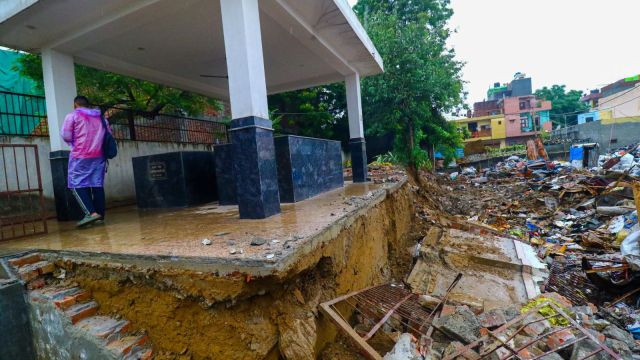‘If the rain had stopped, they would have been at work’: Families mourn 7 killed in Southeast Delhi wall collapse
Residents of the jhuggi in Jaitpur’s Hari Nagar village said heavy rainfall from the night before caused the mud and soil to slide down on Saturday morning, taking the boundary wall next to their homes down with it
 According to the jhuggi residents, heavy rainfall from the night before caused the mud and soil to slide down on Saturday morning, taking the wall down with it (Express Photo)
According to the jhuggi residents, heavy rainfall from the night before caused the mud and soil to slide down on Saturday morning, taking the wall down with it (Express Photo)They would have gone to work if the rain had stopped the night before. Instead, residents of a small jhuggi in Jaitpur’s Hari Nagar village, in Southeast Delhi, stayed home on Saturday.
Around 9 am, a boundary wall of a samadhi soundlessly collapsed onto their homes — killing seven people, including two children.
The victims are Baby Ruksana (7), Baby Hasina (7), Rabiul (27), Rubina (25), Safiqul (27), Muttus (50), and Doli (28). Hasibul (25), the sole survivor, is currently being treated at Safdarjung Hospital, said police.
“All of us stayed home today. The jhuggi was flooded, and we spent the whole morning shifting our belongings. Everyone was sitting on their beds, keeping their feet away from the water… then we heard the crash and…,” Meena Bibi (45), one of the residents, was too overcome with grief to continue.
Meena and Meher Munshi (50) lost their daughter, Rubina, and granddaughter, Hasina, in the collapse.
“Rubina lived away from the wall, just beside us. She had shifted to the new house next to it just a week ago,” said Meena.
The boundary wall in question was to the right of the memorial site, which a man had built for his parents in 2022. The jhuggi was at least 10 feet below the memorial, with shacks lined up along the wall.
According to the jhuggi residents, heavy rainfall from the night before caused the mud and soil to slide down on Saturday morning, taking the wall down with it.
Anwar (32) was among the first people from the jhuggi to start the rescue operation. “The wall collapsed without any warning. Muttus was standing near his daughter when he saw it falling. He pushed his daughter out of the way before it fell on him. His legs were completely crushed, and he was screaming for help… he died before we could pull him out.”
Hearing the crash, locals from nearby houses rushed to help. Anwar pulled out Safiqul with their help before the police arrived.
Muttus’ daughter, Moyna (11), sat silently in the corner of one shack as women surrounding her mourned and wept. Playing with the hem of her green satin frock — the only possession she has left — she quietly wiped her tears and stared into space.
Parvina (25), who is three to four months pregnant, lost her husband, Rabiul, and daughter, Ruksana. She retched and coughed as her grief made its way out of her in wails.
“O maa go, ami kili bachbo? Amake kene lilo na? Ruksana, amar sonamuni (How will I live? Why didn’t God take me instead? Ruksana, my sweetheart),” cried the anguished mother.
She clutched her pregnant belly and wailed, “How will I raise this child alone? That wall fell, and my world ended.”
Meena and Munshi stood still near Parvina’s door, too shocked to cry. Their son-in-law, Hasibul, is the only survivor. However, the couple was worried if he would make it. “He was crushed below the waist,” said Munshi.
Through the haze of grief, Meena worried for Moyna. “The girl has no one in the world. Her mother died years ago, and none of her family back home wants to take her in. I hope I can take her in and take care of her,” she said.
Nicharon Bibi (27), who is nursing her youngest, looked at the pile of rubble in anger. “There’s no place for people to stay tonight. Everything got destroyed. If it had stopped raining in the morning, everyone would have left for work. The children would be outside, playing. Everyone stayed in today… people were just cooking or lying down,” she said.
By evening, Intezaar, a local volunteer, arranged for the families to live in an empty warehouse nearby. “We have arranged for some mattresses and food. If neighbours don’t come together at the time of need, who will… they only lived here because they were poor. It was no fault of theirs,” he said.












